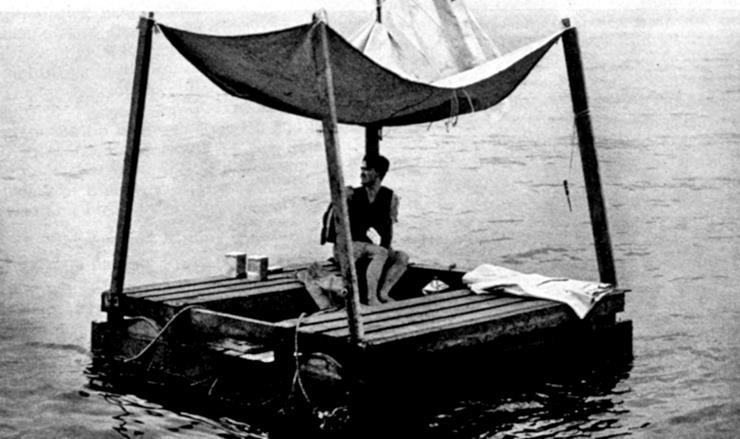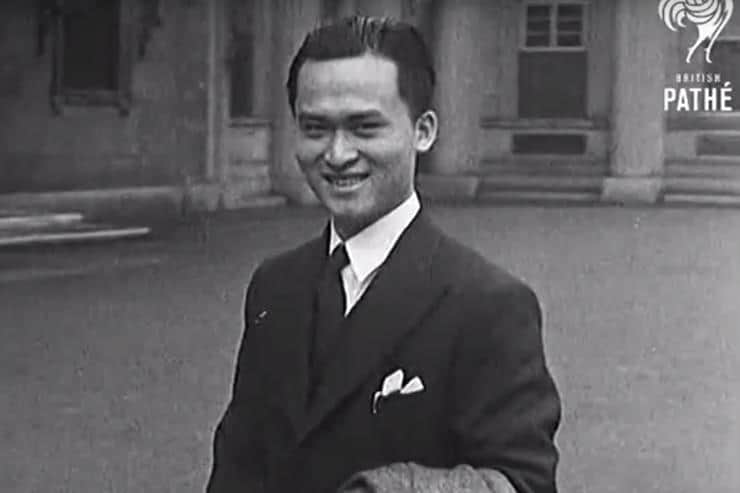
Chinese national Poon Lim spent 133 days at sea in this raft before he was rescued in 1943. Poon Lim passed away in 1991, having lived to the ripe old age of 72. To this day, he still holds the world record for the longest time a person has survived being alone at sea in a life raft. When told of this in 1943, Poon Lim responded, “I hope no one will ever have to break that record.” For more details click here.
By: Phil Kohn. Dedicated to the memory of his father, GM3 Walter Kohn, U.S. Navy Armed Guard, USNR, and all men and women who have answered the country’s call in time of need. Phil can be contacted at ww2remembered@yahoo.com.
On a visit to Germany, King Boris III of Bulgaria on April 2, 1943, reiterates to German Foreign Minister Joachim von Ribbentrop that, despite German demands, the 25,000 Jews in Bulgaria will not be turned over to German authorities even though the two countries are allies. At most, the king says, Bulgaria may intern its Jews, but only in camps under Bulgarian control.

Poon Lim broke all records for being stranded at sea. Once the war was over, Poon had hoped to emigrate to the US. Unfortunately, this proved to be rather difficult since the Chinese immigration quota had already been met. Eventually, special legislation came through sometime in the late 1940’s and Poon Lim was finally given the chance to enter the United States.
On April 3, Chinese ship’s steward Poon Lim is picked up at sea by Brazilian fishermen after spending 133 days alone on a makeshift life raft. His ship, the British armed merchant freighter SS Ben Lomond, had been torpedoed in the South Atlantic on November 23, 1942. Poon became separated from the other survivors, who had been rescued within days. He survived by fishing, catching seabirds and collecting rainwater. In New Zealand, a riot breaks out between American servicemen and New Zealand servicemen and civilians in Wellington. The trouble begins when some American servicemen try to bar Maori (indigenous New Zealand Polynesian) soldiers from entering an Allied Servicemen’s Club. Dozens are injured, but reporting of the riot is squelched by military censors.
U.S. Army Air Corps 1st Lt. William Dyess and nine others escape a Japanese POW camp on Mindanao, the Philippines, on April 4. Dyess had been captured on Bataan when U.S. and Filipino forces surrendered on April 9, 1942. (Dyess and the others elude the Japanese in the jungles for three months with the help of Filipino guerrillas. In July 1943, Dyess is transported to Australia by a U.S. Navy submarine. Once there, he tells the world of the atrocities committed by the Japanese during and after the Bataan Death March.) German radio announces that three former French leaders have been removed to Germany to prevent “establishment of a counter-government.” The trio are: former prime ministers Édouard Daladier and Léon Blum, and former French Army commander in chief Gen. Maurice Gamelin.
The Japanese attack the British on Burma’s Mayu Peninsula on the country’s western coast on April 5. In North Africa, the British Eighth Army attacks the Wadi Akarit Line, an Axis defensive position situated across the route into Tunis. The assault is successful, but the British fail to exploit their breakthrough, and Axis forces regroup. In Berlin, Lutheran pastor Erich Bonhoeffer and attorney Hans von Dohnanyi are arrested by the Gestapo (German secret police) at the headquarters of the Abwehr (German military intelligence). Both men are found to possess incriminating materials showing cooperation with the British. Hitler orders Bonhoeffer and von Dohnanyi to be executed as spies. Der Führer orders, in addition, the execution of Adm. Wilhelm Canaris, the head of the Abwehr.
On April 6, Benito Mussolini arrives in Salzburg, Austria, for a four-day meeting with Adolf Hitler. The agenda: to bolster il Duce’s flagging morale. Hitler does most of the talking; a suggestion by Mussolini about possibly making peace with the Soviets is strongly rebuffed by der Führer. In Tunisia, British and Indian forces overrun the Italian troops defending Wadi Akarit, near Gabès.
Japanese planes, as part of “Operation I-Go,” attack Allied ships off Guadalcanal and Tulagi in the Solomon Islands on April 7. Bolivia declares war against the Axis powers, becoming the 33rd nation to do so.
Gen. Masakazu Kawabe on April 8 succeeds Gen. Shōjirō Iida as commander of Japanese forces operating in Burma. A decision is made to improve Japanese logistics there by building a new railroad in the northern part of the country, using forced labor.







